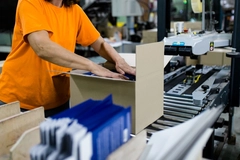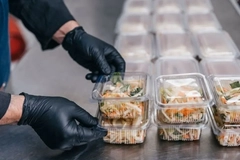Amcor’s 2020 Sustainability Report reveals US$7.7 billion recyclable packaging revenue

13 Nov 2020 --- Amcor is launching its 2020 Sustainability Report, highlighting US$7.7 billion of its revenue is now generated from recyclable products. The consumer packaging giant generated US$12.5 billion in global sales in fiscal year 2020 (78% flexible packaging and 22% rigid packaging).
The report spotlights increased design for recyclability products, post-consumer recycled (PCR) material use and expansions to partnership activity.
Amcor’s PCR resin use reached over 83,000 tons this year. This higher utilization of PCR prevented over 100,000 tons of CO2 emissions as recycled resin has a lower carbon footprint than virgin material.
The Australian-headquartered company also reduced operational waste disposal by over 3,200 tons – a 10 percent reduction this year.
Amcor upped its partnership activity, including joining forces with WWF ReSource: Plastic activation hub – a global consortium of companies and organizations collaborating to keep waste out of the environment.
“At Amcor we believe that winning for the environment means that we are winning as a business. As a market leader, we’re committed to using our innovation capabilities to ensure that all of our products are recyclable or reusable by 2025 – but we know that this is only one stage of the cycle,” notes David Clark, vice president for sustainability at Amcor.
“A sustainable, responsible approach to packaging requires more than just recyclable products, it also needs infrastructure development and customer action.”
“This year’s sustainability report outlines our continued work to achieve more sustainable outcomes and to use our unique position to accelerate more sustainable solutions.”
Lightest edible oil bottle in Brazil
Amcor adapted its leading-edge engineering and design technology, developing “the lightest” 900 ml PET bottle for edible oil in Brazil. The custom-designed container for agribusiness and food producer Bunge, São Paulo, is 22 percent lighter than competitive bottles while providing greater productivity and increased sustainability benefits. Amcor developed “the lightest” 900 ml edible oil PET bottle in Brazil.
Amcor developed “the lightest” 900 ml edible oil PET bottle in Brazil.
The 14 g container for Bunge’s Oleo de soja Soya brand weighs 4 g less than standard bottles and marks Amcor’s entry into the Brazilian edible oil market.
“This new bottle is a huge technological achievement because we were able to replicate the current bottle’s shape and specifications but at a lighter weight,” explains Ivan Assenco, R&D process coordinator at Amcor.
“During a highly focused three-year development project, we leveraged our expertise in R&D, design, and engineering to create a one-of-a-kind bottle for edible oil.”
Lightweighting is an important differentiator in the edible oil market. Amcor developed a new lightweight preform, maintaining the same shape while optimizing topload strength, wall thickness, material distribution, and stacking strength.
The R&D team conducted a finite element analysis (FEA) study, optimizing the design and meet wall thickness requirements, as the container required a high stretch ratio. The redesign also maintains the same look, feel, and consumer handling experience.
Recyclable cheese wraps
Amcor’s premium Matrix paper-based and paraffin-free cheese packaging received a Silver award at the Dow-sponsored 2020 Packaging Innovation Awards. The innovation provides the right breathable barrier for soft cheese while removing paraffin and transforms a non-recyclable packaging material into a cheese wrap recyclable in paper streams.
Soft cheese continues to ripen after it is packaged, and this process needs to be managed through moisture absorption and gas exchange. Cheese producers have typically used paper packaging with a wax layer, which can easily transfer to the cheese product, potentially impairing its taste.
Using Matrix’s breathable technology, soft cheese producers can control the ripening process, delivering the right taste and texture to consumers throughout the cheese’s shelf life.
The other challenge with traditional paraffin-coated packaging is it makes the paper hard to recycle. Amcor’s Matrix range is a more sustainable option thanks to its independently-tested recyclability in the paper stream. Amcor’s Matrix paper-based and paraffin-free cheese packaging is recyclable in paper streams.
Amcor’s Matrix paper-based and paraffin-free cheese packaging is recyclable in paper streams.
The production and use of Matrix can reduce the packaging’s carbon footprint by a reported 28 percent.
As a partner in the Ellen MacArthur Foundation’s New Plastics Economy, this innovation supports Amcor’s commitment to developing all its packaging to be recyclable or reusable by 2025.
Sustainability’s central role
Amcor’s 2020 Sustainability Report reveals its delivery against key target areas and re-establishes the central role sustainability plays in its business.
The report details the New York Stock Exchange-listed company’s efforts across its rigids, flexibles and specialty cartons businesses.
The report is prepared in accordance with the Global Reporting Initiative (GRI) Standards: Core option and Sustainability Accounting Standards Board (SASB) Containers & Packaging Sustainability Accounting Standard version 2018-10.
It is the ninth year Amcor has reported in accordance with GRI and the first year it has reported using the SASB Standards.
By Joshua Poole











